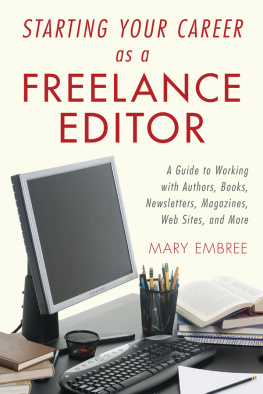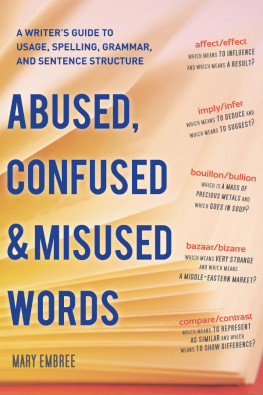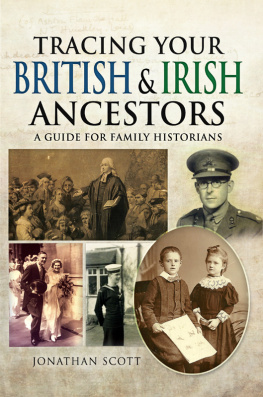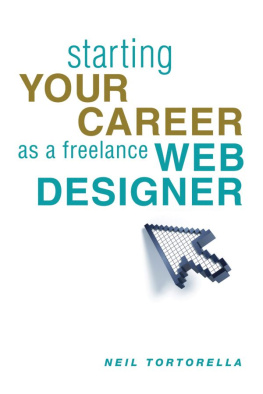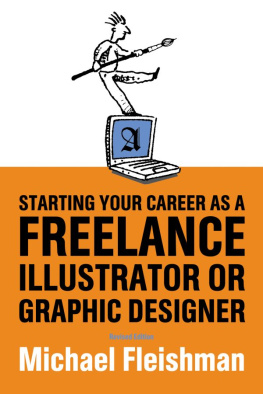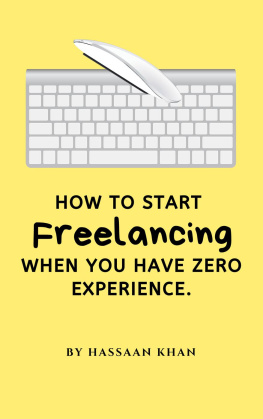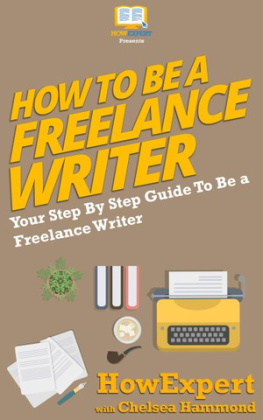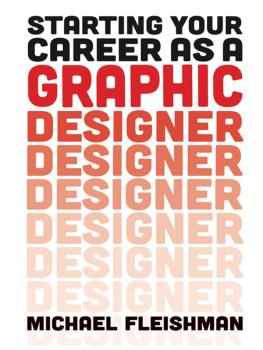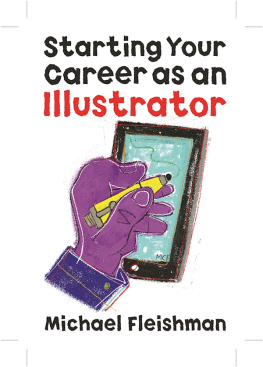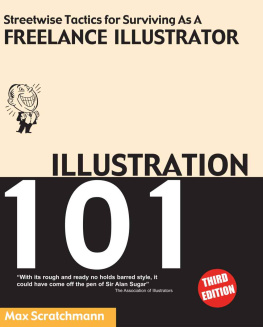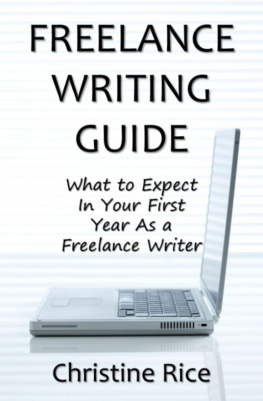Copyright 2012 by Mary Embree
All rights reserved. Copyright under Berne Copyright Convention, Universal Copyright Convention, and Pan American Copyright Convention. No part of this book may be reproduced, stored in a retrieval system, or transmitted in any form, or by any means, electronic, mechanical, photocopying, recording or otherwise, without the express written consent of the publisher, except in the case of brief excerpts in critical reviews or articles. All inquiries should be addressed to Allworth Press, 307 West 36th Street, 11th Floor, New York, NY 10018.
Allworth Press books may be purchased in bulk at special discounts for sales promotion, corporate gifts, fund-raising, or educational purposes. Special editions can also be created to specifications. For details, contact the Special Sales Department, Allworth Press, 307 West 36th Street, 11th Floor, New York, NY 10018 or .
15 14 13 12 11 5 4 3 2 1
Published by Allworth Press,
an imprint of Skyhorse Publishing, Inc.
307 West 36th Street, 11th Floor, New York, NY 10018.
Allworth Press is a registered trademark of Skyhorse Publishing, Inc., a Delaware corporation.
www.allworth.com
Cover design by Jane Sheppard
Library of Congress Cataloging-in-Publication Data
Embree, Mary,
Starting your career as a freelance editor : a guide to working with authors, books, newsletters, magazines, websites, and more / by Mary Embree.
pages cm
Includes bibliographical references and index.
ISBN 978-1-58115-890-8 (pbk.)
1. EditingVocational guidance. I. Title.
PN162.E43 2012
808.027023dc23
2011048747
Printed in the United States of America
Contents
Introduction
I f you ever considered a freelance career as an editor, there probably couldnt be a more auspicious time to launch it than now. It has become a do-it-yourself world full of opportunities for creative and capable people who are also entrepreneurs.
In this age of economic uncertainty there are fewer traditional publishers of books, newspapers, magazines, and other periodicals than there were just a few years ago. Many existing publishers are issuing fewer paper copies and more people are getting their news and information online. But in most cases, the online publications contain just as many articles as they did when paper issues of these publications were being circulated. Some of the online copies of each issue carry a lot more information than their paper-only issues did. And all of those words have to be edited.
To cut down on costs publishers are hiring fewer in-house editors. And that opens up the field for freelancers. As we are independent contractors, we dont take up desk space in the office. Employers dont have to pay us for sick days or provide us two-week (or longer) vacations. All of that down time when we are not productive doesnt cost an employer a penny.
In addition to publishers, there are many small businesses and organizations that need the services of freelance editors, as well as departments in large companies. The material could be proposals, manuals, and catalogs. Individuals also need editors for career-enhancement writing such as rsums, dissertations, and term papers. They may also want our services for their more personal writing such as family histories and memoirs.
Although this book focuses more on book editing than on other kinds of editing, the principles are the same. No matter what field you are working in, you not only have to know what is standard for that specific genre and style but you must keep up to date on the changes that frequently occur in styles, spelling, punctuation, format, and so forth. As you will most likely be working directly with the author even when you are being paid by a publisher, your services will be most valuable if you can spot areas of change that your author has missed or doesnt even know about.
Editing is not just about correcting a manuscript, it is about guiding an author toward the completion of a first-rate professional piece of work. He or she will get the accolades while you, the editor, will fade into the background. And that is as it should be. After all, the author is the creator, the editor only helps to shape it and make it shine. However, without a qualified editor, many authors would never get published. Our work is vitally important.
There has been enormous growth in the number of low-priced books created by small publishers and self-publishers, some of whom have published only one book. And it is through working directly with authors and independent publishers that the freelance editor can flourish. It seems like almost everyone is writing a book or thinking about it.
There is a plethora of so-called self-publishing companies who help authors in every aspect of producing and selling their books. Many of these companies also provide editing services. However, in most cases editing is the weakest link in their chain of services. And that is unfortunate because it is the most important factor in producing a high-quality book. If a book isnt professionally edited according to book publishing standards it becomes immediately apparent to the reader that the publisher is an amateur, which results in the author losing much of his or her credibility as well as potential sales.
There are many different kinds of writing that need the magic touch of a good editor. In addition to books there are articles, dissertations, brochures, reports, abstracts, editorials, speeches, reviews, ad copy, and many more.
In writing this book I did a great deal of research on other editors in various fields, and learned that they came into the profession through very different pathways. Few of them set out to become editors and fewer still expected to end up working for themselvesand making a living at it!
Even so, most of them always knew that they could be editors. Like any art, editing requires both talent and craftsmanship. A good editor possesses not only training but an innate ability, a keen eye, and excellent language skillsall attributes that are capable of turning ordinary writing into something extraordinary.
All writers who want their work to look professional need an editor, whether they realize it or not. Even though I am a published author and have been a freelance editor for nearly twenty years, I cant always see my own mistakes. Im just not that objective about my writing. Too many things can go wrong, from grammatical errors and repetition to inconsistent styles. Like all writers, I sometimes overlook the error because I know what I meant to write and my imagination sees it as it should be, not as it is. Thats just human nature.
There is a difference between editing and proofreading but both have their place. A proofreader can come in very handy after the entire document has been edited. He will notice a missing word, too many spaces between words, typographical errors, and misplaced punctuation. Its always helpful for an editor to have a competent proofreader who can look over the final draft before it goes back to the writer or to the printer.
There are many different kinds of editing and many different kinds of documents. They all require specific expertise that can only be gained through training and experience. No one can be proficient in all of them. This book cant tell you what your particular path should be because there are too many ways to go. But you will learn what you need to know to decide on a specialty and where to research the information on how to get started. As you examine all of the advantages and disadvantages to becoming a freelance editor, you will be better prepared to make the decision: is this career meant for me?

